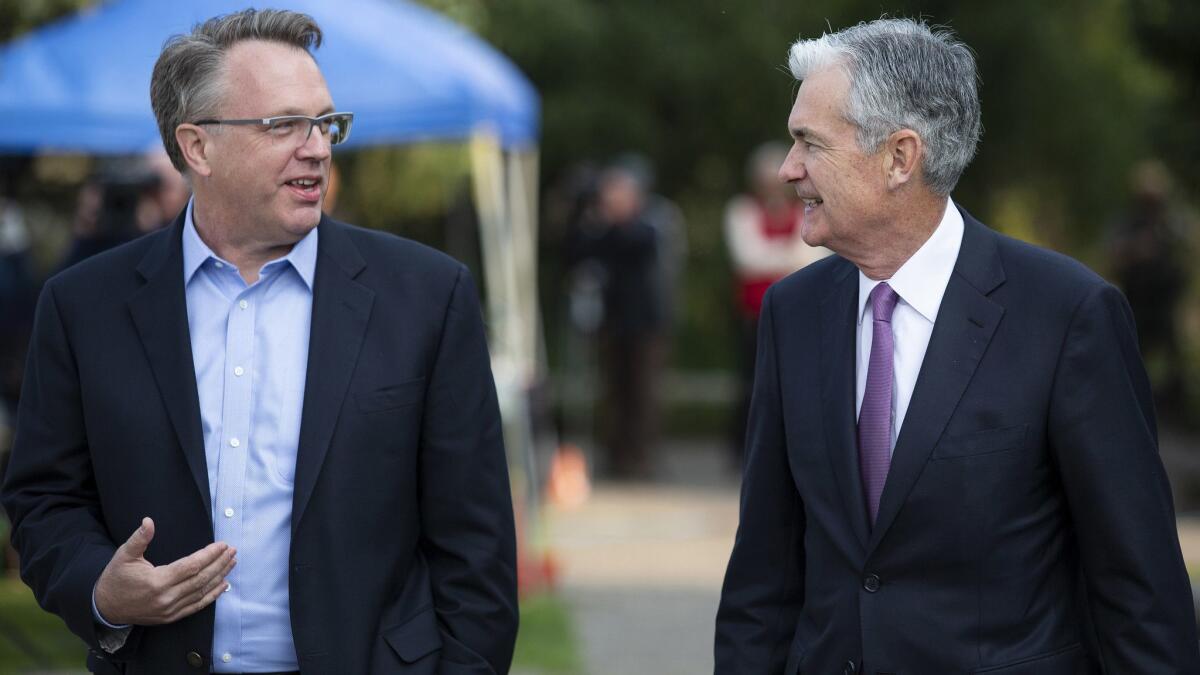Federal Reserve’s plan for interest rates is flexible, Fed official says. Markets plunged anyway

- Share via
The president of the Federal Reserve Bank of New York sought to reassure investors Friday that the U.S. central bank will listen to financial-market signals in setting interest rates, emphasizing that the outlook for some more gradual hikes next year is guidance, not a commitment.
“This is not a commitment, or a promise, or in any way a sense that we know for sure that’s what we are going to do,” John Williams said during an interview on CNBC. “We are actually saying pretty clearly this is how we see it now based on our positive, pretty optimistic view of the economy, and we will change that as needed.”
U.S. stocks extended gains after Williams’ comments eased concerns that the Fed would continue tightening monetary policy regardless of plunging equity prices. However, the market resumed its plunge later and the Standard & Poor’s 500 index finished the day down 2%, at 2,416.58, a 19-month low. The Nasdaq index finished down nearly 3% and technically has entered a bear market.
“The really important message is the economy is strong. That’s why we are seeing strength going into the new year. We expect a healthy economy in 2019. That is our baseline expectation,” the New York Fed chief said in the interview. “However, we are listening very carefully to what’s happening in markets.”
The Fed’s rate-setting committee, of which Williams is vice chairman, voted unanimously Wednesday to raise rates for a ninth time in three years and published projections signaling it expects two hikes in 2019.
Williams endorsed the rate-hike projections, saying “something like two rate increases” next year “would make sense in the context of a really strong economy.” He also suggested the Fed didn’t yet need to rethink its balance-sheet unwind given the strong outlook, but he emphasized that policymakers would be flexible as conditions change.
“We did not make a decision to change the balance-sheet normalization right now, but as I said, we’re going to go into the new year with eyes wide open,” Williams said. “I don’t see the need today to change our balance-sheet normalization.”
Fed Chairman Jerome Powell’s press conference Wednesday after the rate-hike announcement led to more selling in financial markets as he voiced confidence that the economy would likely remain strong enough in the year ahead to require additional rate increases.
“Maybe the Fed is not being proactive, but they are not entirely oblivious to what is going on,” said Priya Misra, head of global rates strategy at TD Securities. Williams “provided that little bit of a shoulder for the market to lean on, which I think Chair Powell sounded a little more blase about.”
More to Read
Inside the business of entertainment
The Wide Shot brings you news, analysis and insights on everything from streaming wars to production — and what it all means for the future.
You may occasionally receive promotional content from the Los Angeles Times.










